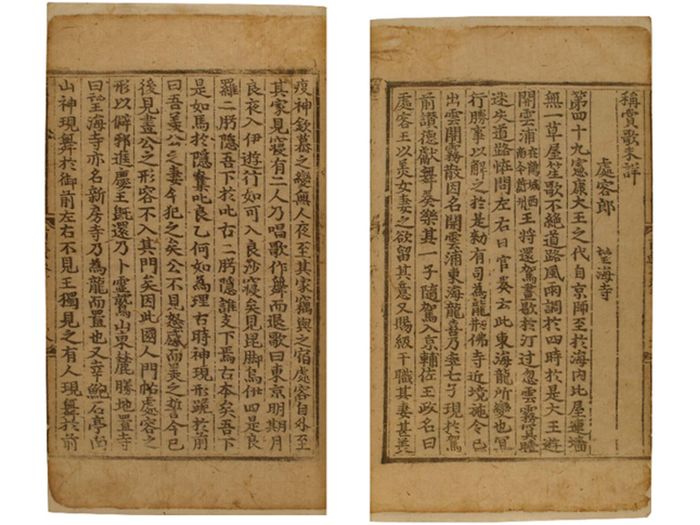(Translation) 處容郎
| Primary Source | ||
|---|---|---|
 |
Title | |
| English | ||
| Chinese | ||
| Korean(RR) | ||
| Text Details | ||
| Genre | ||
| Type | ||
| Author(s) | ||
| Year | ||
| Source | ||
| Key Concepts | ||
| Translation Info | ||
| Translator(s) | Participants of 2018 Hanmun Summer Workshop (Intermediate Training Group) | |
| Editor(s) | ||
| Year | 2018 | |
Original Script
Translation
Student Translation : (Julian Butterfield)
. . . The king married him to a beautiful woman, with the intention of making him stay. He also bestowed [upon Ch'ŏyong] the office of Kŭpkan.[1] Ch'ŏyong's wife was extraordinarily beautiful, and the god of plague revered and admired her [so much that] he transformed into a person,[2] and coming to their house at night stole in and slept with her. Ch'ŏyong came home from being out and saw that there were two people lying [there]. Thereupon he sang a song, danced, and retreated. He sang,
The Eastern Capital is bright with moonlight,
When night comes I go wandering,
Entering the bedchamber I see four legs.
Two of these belong to me—to whom do the other two?
[What was] originally mine—how have they been snatched away?
At that moment, the god revealed himself, and kneeling before [Ch'ŏyong] said, "I envied Sir of his wife, and now I have violated her—[yet] Sir does not show anger. I am moved and impressed by this. I vow that hereafter, [wherever there is] a picture in Sir's likeness, I will not enter the gate" Thus, people of that country pasted likenesses of Ch'ŏyong on their doors, avoiding evil and advancing the joyous.
- Discussion Questions:
- I had some trouble recalling the relationships made between terms in the song by the Korean particles, so might be pretty far off the mark here. Any recommendations?
(JG) I think you did pretty well. I only noted it all as past tense ("in the night I went wandering..."), but your version looks great :)
(YO) The last line of the poem ([What was] originally mine—how have they been snatched away?) should be [What was] originally mine—now that they have been snatched away, what do I do?
(YO) Here is a list of native-Korean phrases in the poem (with grammatical details). This is just to show you the structure of this hyangga 鄉歌 (local song), and is in rough state. Below "phon." means a phonetic additive to indicate that the given word is read in the native tongue.
明期: pal + ki 期 < bright + adnominal particle
月良: tal + ra 良 < moon + locative particle
入伊: tŭl + i 伊 < enter + continuative particle
逰行如可: no ni + taga 如可 < play/roam + interruptive particle
入良沙: tŭl + rasa 良沙 < enter + explanative (reason) particle
寢矣: chari < bed + phon. 矣
見昆: pk + kon 昆 < look + conjunctive with topic particle
脚烏伊: karo + ri < leg + phon. 烏 + subject particle 伊
四是良羅: nes + irera 是良羅 < four + copulative final
二肹隠: tu + vŭr 肹 + ŭn 隠 < two + phon. + topic particle
吾下扵叱古: nae hae + ŏtko 扵叱古 < my 吾 possession 下 + copulative with conjunctive particle
二肹隠: tu + vŭr 肹 + ŭn 隠 < two + phon. + topic particle
誰支下焉古: nugi hae 下 + ŏn’go < who + phon. (支) possession + copulative with interrogative final
本矣: pondi < originally + phon. 矣
吾下是如馬扵隠: nae hae + ida 是如 + maranan 馬扵隠 < my (吾) possession (下) + copulative particle + concessive particle
奪叱良乙: a + sa + nal 良乙 < take away + phon. 叱 + subjunctive particle
為理古: ha + rigo 理古 < do + interrogative final